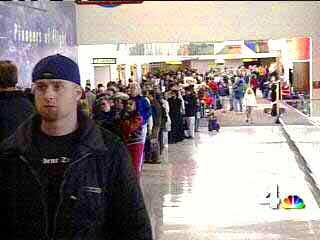Fri, Sep 10, 2004
Test Checks Passenger Documents for Explosives at Reagan
National Airport
 The TSA says it's launching a pilot
program at four airports in which passenger documents such as
boarding passes or state driver’s licenses will be scanned
for traces of explosives.
The TSA says it's launching a pilot
program at four airports in which passenger documents such as
boarding passes or state driver’s licenses will be scanned
for traces of explosives.
The pilot, which begins this week at Ronald Reagan Washington
National Airport (DCA), uses an Explosives Trace Detection Document
Scanner, the same technology recently proved effective in
TSA’s Transit Rail Inspection Pilot Project in
Connecticut.
"By leveraging results of last month’s tests in the rail
environment, TSA utilizes proven explosives detection technologies
to safeguard the traveling public in another mode of
transportation," said Rear Admiral David M. Stone, USN (Ret.),
Assistant Secretary of Homeland Security for TSA. "This test and
others studying new trace explosives detection tools, passenger
identification, and air cargo screening, illustrate TSA’s
commitment to improving security in all modes by utilizing the
latest emerging technologies."
DCA is the first airport to conduct an operational test of the
new equipment. The tests will be launched next week at Los Angeles
International Airport, and at New York’s John F. Kennedy
International Airport and Chicago’s O’Hare
International Airport by the end of the month.
The Document Scanner analyzes samples collected by swiping the
surface of a document over a collection disc and alerts the
screener if explosive residue is detected. During the pilot, only
passengers set aside for secondary screening at Terminal B’s
South Pier checkpoint will have their boarding passes scanned. If
the Document Scanner alarms, the screener will implement additional
screening procedures.

The TSA says this is one in a series of next generation tools
being tested. They include explosive trace detection portals, which
are being tested in four airports with nearly a dozen more to come
online in the next year. The Registered Traveler Pilot Program, in
place at five airports, is another innovative instrument to improve
security through identity verification. Finally, in the air cargo
arena, a six-airport test is using bulk Explosives Detection
Systems (EDS) machines to screen non-containerized cargo.
More News
Pilot Also Reported That Due To A Fuel Leak, The Auxiliary Fuel Tanks Were Not Used On June 4, 2025, at 13:41 eastern daylight time, a Piper PA-23, N2109P, was substantially damage>[...]
From 2023 (YouTube Edition): Reflections on War’s Collective Lessons and Cyclical Nature The exigencies of war ought be colorblind. Inane social-constructs the likes of racis>[...]
Pilot Reported That He Was Unfamiliar With The Single Seat Amateur-Built Airplane And His Intent Was To Perform High-Speed Taxi Testing Analysis: The pilot reported that he was unf>[...]
From 2023 (YouTube Edition): First Kits to Ship October 2023 Having formerly resurrected the storied shape of the Ryan ST—in effigy, anyway—Montrose, Colorado-based Tim>[...]
Performance-Based Navigation (PBN) [ICAO] Area navigation based on performance requirements for aircraft operating along an ATS route, on an instrument approach procedure or in a d>[...]
 NTSB Prelim: Piper PA-23
NTSB Prelim: Piper PA-23 Classic Aero-TV: One Mans Vietnam
Classic Aero-TV: One Mans Vietnam NTSB Final Report: Capella Aircraft Corp FW1C50
NTSB Final Report: Capella Aircraft Corp FW1C50 Classic Aero-TV: Timber Tiger Touts Curtiss Jenny Replicas
Classic Aero-TV: Timber Tiger Touts Curtiss Jenny Replicas ANN's Daily Aero-Term (07.04.25): Performance-Based Navigation (PBN) [ICAO]
ANN's Daily Aero-Term (07.04.25): Performance-Based Navigation (PBN) [ICAO]




